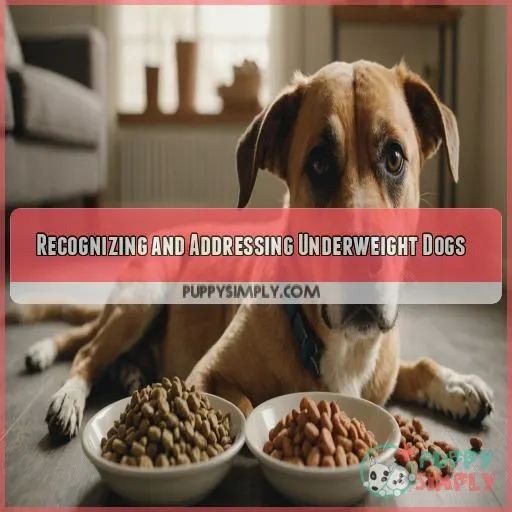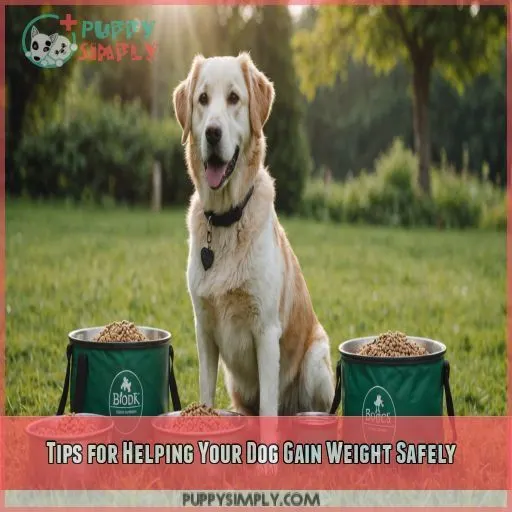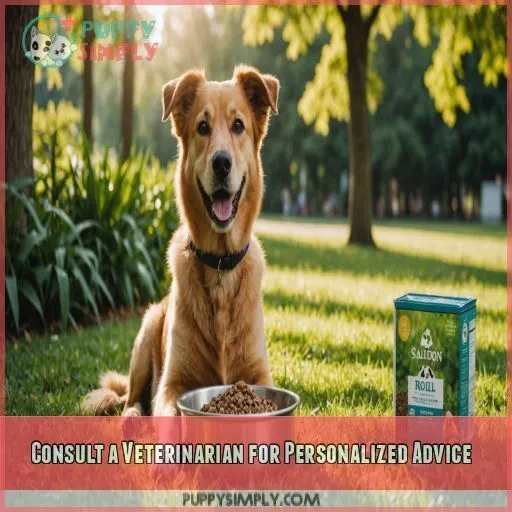This site is supported by our readers. We may earn a commission, at no cost to you, if you purchase through links.
 You’re on a mission to help your underweight pup pack on some healthy pounds. Choosing the right dog food for weight gain is a great first step.
You’re on a mission to help your underweight pup pack on some healthy pounds. Choosing the right dog food for weight gain is a great first step.
Look for high-calorie dog food with wholesome ingredients like chicken, fish, or lamb, and a balanced mix of protein, fat, and complex carbs. Aim for a fat content of around 15-18% to support weight gain.
Some top picks include Bully Max High Protein Dog Food and Purina Pro Plan High Calorie Dog Food.
But remember, every dog is different, so consulting with your vet is a must to create a customized weight gain plan.
Table Of Contents
- Key Takeaways
- Recognizing and Addressing Underweight Dogs
- Dietary Requirements for Weight Gain
- Top 9 Best Dog Foods for Weight Gain
- Tips for Helping Your Dog Gain Weight Safely
- Consult a Veterinarian for Personalized Advice
- Frequently Asked Questions (FAQs)
- What food can I give my dog to gain weight?
- Which dog food is best for weight gain?
- What is the best weight gainer for dogs?
- What is rapid weight gain in dogs?
- Can puppies eat dog food designed for weight gain?
- How often should I feed my underweight dog daily?
- Are there specific vitamins for canine weight gain support?
- Can I mix weight gain dog food with regular food?
- Are raw diets more effective for canine weight gain?
- Conclusion
Key Takeaways
- You’re on the right track by choosing a high-calorie dog food with wholesome ingredients, such as chicken, fish, or lamb, and a balanced mix of protein, fat, and complex carbohydrates – your furry friend will thank you!
- Don’t forget to consult with your vet to create a customized weight gain plan for your dog, as every pup is different and may have unique needs or health conditions that require special attention.
- When selecting a dog food for weight gain, prioritize high-quality protein sources and healthy fats that support muscle growth and overall health, rather than fillers and artificial preservatives that can hinder progress.
- To help your dog gain weight safely, remember to gradually increase their food intake, offer high-calorie treats and supplements, provide regular exercise for muscle mass, and monitor their progress closely to adjust their diet as needed.
Recognizing and Addressing Underweight Dogs
If your furry friend is looking a bit too lean, it’s time to take action.
Recognizing the signs of an underweight dog is the first step in helping them gain the weight they need to thrive.
Signs of an Underweight Dog
Noticing your furry friend is a little too skinny can be alarming.
Look for telltale signs of an underweight dog, such as visible ribs, hips, or shoulders.
Other red flags include reduced energy levels, poor coat condition, depression, or finicky eating habits.
If you’ve checked all these boxes, it’s time to think about a weight gain dog food to get your pup back on track.
Why Your Dog Needs to Gain Weight
Your furry friend needs to gain weight for various reasons. Maybe they’re recovering from an illness or have breed-specific needs. Whatever the reason, it’s important to find the right dog food for weight gain. Here are four key reasons:
- Illness recovery: They need extra calories to bounce back.
- Breed-specific needs: Some breeds require more weight for good health.
- Muscle building: To boost energy levels and overall fitness.
- Healthy coat: A balanced diet helps achieve a shiny, vibrant coat.
Health Risks Associated With Being Underweight
What happens when your furry friend is underweight? A weakened immune system, bone health issues, reduced energy levels, heart problems, and reproductive issues can all arise. Here are some potential health risks associated with being underweight:
| Health Risk | Description |
|---|---|
| Weakened Immune System | Increased susceptibility to infections |
| Bone Health Issues | Osteoporosis, fractures, and osteopenia |
| Reduced Energy Levels | Lethargy, depression, and decreased mobility |
| Heart Problems | Cardiac issues, including heart failure |
Dietary Requirements for Weight Gain
To help your dog gain weight, you’ll need to focus on calorie-dense diets that pack a punch without overwhelming their sensitive stomachs. When selecting a dog food for weight gain, prioritize high-quality protein sources and healthy fats that support muscle growth and overall health, rather than fillers and artificial preservatives that can hinder progress.
Look for a Calorie-dense Diet
Now that you’ve identified your dog as underweight, let’s get them back on track with a calorie-dense diet. You’re looking for food that packs a punch without filling their belly too quickly. Consider these must-haves:
- High-quality protein sources like chicken or fish
- Whole grains for sustained energy
- No fillers or artificial preservatives to slow them down
Fat Content: What to Look for in Dog Food
In terms of fat content in dog food, look for healthy sources like chicken fat, salmon oil, or flaxseed. Aim for a fat percentage of 15-18% to support weight gain without causing digestive upset. Omega-3 fatty acids are a bonus, but prioritize the right balance of fat and protein for your pup’s needs.
Top 9 Best Dog Foods for Weight Gain
You’re on the hunt for the best dog food to help your furry friend gain some much-needed weight with high-calorie nutrient-dense ingredients, and we’ve got you covered.
, and we’ve got you covered. Here are the top 9 high-calorie dog foods that can help your dog bulk up in no time, from Bully Max High Protein Dog Food to Grain Free Lamb Dog Food.
1. Bully Max High Protein Dog Food
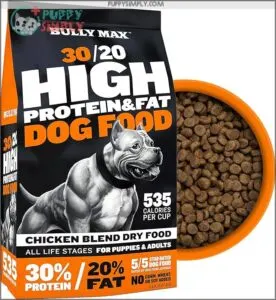
You’re looking for a high-calorie dog food to help your furry friend gain weight quickly! Bully Max High Protein Dog Food is a top pick, with 535 calories per cup and a unique meat-based formula rich in high-quality protein sources like chicken meal and brown rice.
, with 535 calories per cup and a unique meat-based formula rich in chicken meal and brown rice. Infused with chicken fat, dried plain beet pulp, and whitefish meal, this food provides a premium, balanced diet for overall health and well-being. It’s suitable for all dog breeds and ages, and made in the USA with globally sourced ingredients.
Best For: Bully Max High Protein Dog Food is best for dogs needing to gain weight quickly, like growing puppies or active working dogs.
- Packed with calories, protein, and fat for rapid muscle growth.
- Unique meat-based formula with high-quality ingredients.
- Suitable for all breeds and ages.
- Expensive compared to other dog food brands.
- Bag size may be small for the price.
- Not all dogs may enjoy the taste or smell.
2. Purina Pro Plan High Calorie Dog Food
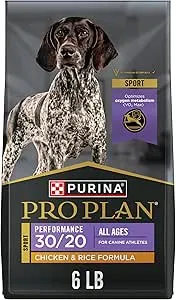
You’re looking for a high-calorie dog food to help your furry friend gain weight. Purina Pro Plan High Calorie Dog Food is a top contender. With 30% protein and 20% fat, it’s perfect for active dogs and working breeds. Real chicken is the first ingredient, providing essential amino acids for muscle growth. This food is also great for picky eaters, and you can mix it with other options for added variety. Talk to your vet to make sure it’s the right fit for your dog’s needs.
Best For: Active dogs, working breeds, and those needing to gain weight.
- High protein and fat content for energy and muscle growth.
- Real chicken as the first ingredient, providing essential amino acids.
- May appeal to picky eaters.
- Some dogs may prefer a mix with other food options.
- May not be suitable for all dogs, particularly those with sensitivities.
- Consult with your vet to ensure it’s the right choice for your dog.
3. Dog Weight Gainer Formula
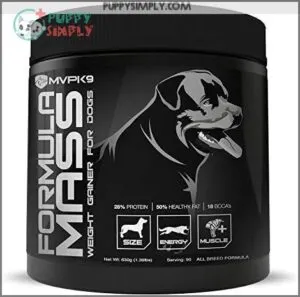
Ready to give your furry friend a boost? The Dog Weight Gainer Formula is here to help! This powerful supplement packs 50% healthy fats, 28% whey protein, and 18+ BCAA’s into each serving. Made in the USA with no fillers, salts, or sugars, it’s a guilt-free way to support muscle growth and energy. Simply sprinkle it on their food, and watch them thrive. With a 100% satisfaction guarantee, you can trust this formula to help your dog reach their ideal weight.
Best For: This weight gainer formula is best for skinny, underweight dogs, picky eaters, and malnourished dogs.
- Packed with healthy fats, protein, and BCAAs to help dogs gain weight.
- Made in the USA with no fillers, salts, or sugars.
- Easy to use by simply sprinkling on food.
- Some dogs may not like the taste.
- May need to adjust the amount given to smaller dogs.
- May need to add water to the powder to make it easier to mix with food.
4. Chicken Meal Dog Food 4.4 lbs
You’re looking for a high-calorie dog food to help your furry friend gain weight. Consider a 4.4 lbs bag of chicken meal dog food, made with wholesome ingredients like chicken meal, millet, and chicken fat. This food is free from common allergens like wheat, corn, and soy, and features probiotics and enzymes for digestive support. With multiple protein sources, it’s easy to rotate and keep your dog engaged. Plus, it’s 100% natural, with no synthetic vitamins or minerals added.
Best For: This product is best for dog owners looking for a high-calorie, natural dog food with multiple protein sources and digestive support to help their furry friend gain weight (Source).
- Made with wholesome ingredients like chicken meal, millet, and chicken fat, and is free from common allergens like wheat, corn, and soy .
- Features probiotics and enzymes for digestive support, making it a great option for dogs with sensitive stomachs .
- 100% natural with no synthetic vitamins or minerals added, making it a great option for owners who prioritize their dog’s health and well-being .
- May not be suitable for dogs with specific dietary restrictions or allergies not listed .
- The 4.4 lbs bag size may not be convenient for owners who prefer to buy in bulk or have larger dogs .
- Some owners may find the ingredient list to be too long or complicated, which could be a drawback for those who prefer simpler recipes .
5. Grain Free White Fish Salmon Dog Food
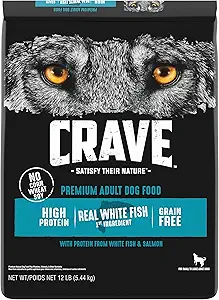
You’re considering Grain Free White Fish Salmon Dog Food to help your furry friend gain weight. This food is a great option, with 34% high protein from real animal sources like salmon and ocean fish (Source). It’s also grain-free, with peas as a carbohydrate source, making it easily digestible . Just be aware that some users report a strong fish smell, and the kibble size may be too small for larger dogs .
Best For: This food is perfect for dogs of all sizes who need a high-protein diet, especially those with sensitivities to grains.
- High protein content for lean muscle mass.
- Grain-free formula for easier digestion.
- Made with real, high-quality animal protein.
- Some users report a strong fish smell.
- Kibble size may be too small for larger dogs.
- Contains peas, which can be a concern for some dogs with sensitivities.
6. Bully Max Small Breed Dog Food
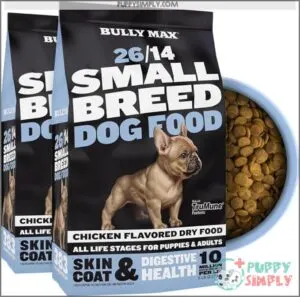
You’re considering Bully Max Small Breed Dog Food to help your furry friend gain weight.
This meat-rich formula is designed for small breed puppies and adult dogs, featuring small, soft kibble for easy chewing and digestion.
Here’s what makes it a good option:
- TruMune postbiotics
- Omega 3 and 6 fatty acids
- No artificial additives
These ingredients help support skin, coat, and digestive health.
However, some users noted the kibble size might be too small for certain breeds, so monitor your dog’s progress closely.
Best For: This is a good option for small breed puppies and adult dogs who need a meat-rich formula for weight gain.
- TruMune postbiotics for enhanced immunity and digestion.
- Enriched with Omega 3 and 6 fatty acids for brain, vision, and immune health.
- Free from artificial additives, corn, soy, wheat, and harmful chemicals.
- The kibble size might be too small for certain breeds.
- Some users reported experiencing smelly gas during the first week of switching their dogs to this food.
- The price might be high compared to other brands.
7. High Calorie Dog Supplement
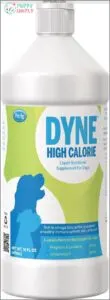
You’re looking for a high-calorie dog supplement to help your furry friend gain weight. Consider a product with a dense form of energy that won’t limit stomach capacity. Look for a formula with high-quality ingredients, vitamins, and nutrients for overall health. With a sweet vanilla flavor, it’s likely to be a hit with your pup. However, always consult with your veterinarian before adding any supplements, especially if your dog has pre-existing health conditions.
Best For: This high-calorie dog supplement is best for dogs who need to gain weight, especially those who are active, pregnant, lactating, underweight, or senior.
- Provides a concentrated source of calories without filling up the stomach.
- Contains vitamins and nutrients for overall health.
- Has a sweet vanilla flavor that most dogs find appealing.
- Can be expensive.
- Requires squeezing into a small container and administering with a syringe.
- Some dogs may experience upset stomachs.
8. Dog Muscle Building Supplement
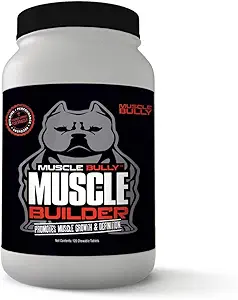
You’re looking for a dog muscle building supplement to help your furry friend gain weight and muscle mass. Consider a product like Muscle Bully, made in the USA with a 100% satisfaction guarantee. This supplement contains ingredients like creatine, L-carnitine, and colostrum to support muscle growth and recovery. However, monitor your dog’s behavior and adjust the dosage accordingly, as some dogs may experience increased energy and aggression. Always consult with your veterinarian before adding any supplements to your dog’s diet.
Best For: Dogs needing support for muscle growth, strength, and recovery.
- Made in the USA with a 100% satisfaction guarantee.
- Contains ingredients like creatine, L-carnitine, and colostrum to support muscle growth and recovery.
- May help with increased energy and improved mobility.
- Some dogs may experience increased energy and aggression.
- May cause increased appetite and slobbering in some dogs.
- Contains creatine, which some customers feel uneasy about using long-term.
9. Grain Free Lamb Dog Food
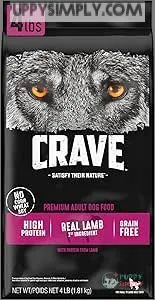
You’re looking for a grain-free lamb dog food to help your furry friend gain weight. CRAVE Grain Free Adult Dry Dog Food with Protein from Lamb is a great option. Made with 34% high protein, it supports a strong, lean body. With no grains, artificial flavors, or preservatives, you can trust what you’re feeding your dog. Many reviewers rave about the flavor and weight gain benefits, especially for older dogs. Give it a try and see the difference for yourself!
Best For: This grain-free lamb dog food is best for dogs who need to gain weight, especially older dogs, and those with sensitivities to starches or carbohydrates.
- High protein content to support a strong, lean body.
- No grains, artificial flavors, or preservatives.
- Many reviewers report their dogs love the flavor and experience weight gain.
- May be more expensive than other brands.
- Some reviewers note that it can cause weight gain, which may lead to health risks like pancreatitis and may not be ideal for all dogs. , which may not be ideal for all dogs.
- Contains peas as a carbohydrate source, which may not be suitable for all dogs with sensitivities.
Tips for Helping Your Dog Gain Weight Safely
You’re on the right track to helping your furry friend gain weight safely. Now, let’s get started with some actionable tips to support your dog’s weight gain journey, from gradually increasing their food intake to providing regular exercise for muscle mass.
Gradually Increase Food Intake
Now that you’ve chosen the right dog food for weight gain, it’s time to think about feeding schedules. Gradually increase your dog’s food intake by 1/4 to 1/2 cup every few days. Monitor their weight and adjust portion sizes as needed. Aim for 3-4 meals a day to prevent overwhelming their stomach and prevent food sensitivity.
Offer High-Calorie Treats and Supplements
Now that you’re gradually increasing your dog’s food intake, it’s time to bring out the big guns – high-calorie treats and supplements. These can be a great way to add some extra calories to your dog’s diet. Here are some ideas:
- Peanut butter-filled Kongs
- Pumpkin and chicken broth treats
- Sweet potato chews
- Carrot and apple slices with almond butter
- Homemade dog biscuits with oats and honey
Provide Regular Exercise for Muscle Mass
Here’s the deal, providing regular exercise for your furry friend is really important for muscle growth and weight gain. Engage your dog in activities that stimulate muscle development, like fetch or agility training. Aim for short, frequent sessions to avoid exhaustion. A balanced exercise routine, combined with a high-calorie diet, will help your dog achieve a healthy weight.
Monitor Weight Gain and Adjust Diet as Needed
As you help your furry friend gain weight, keep a close eye on their progress.
Weigh them weekly and track changes in their body condition score.
Use a food journal to monitor their intake and adjust portion sizes accordingly.
Regular vet checkups will also make sure they’re on the right track.
Don’t forget to review the guaranteed analysis on their dog food label!
Consult a Veterinarian for Personalized Advice
You’re worried about your furry friend losing weight, but before making any drastic changes to their diet, it’s important to talk to a veterinarian for personalized advice. Your vet will help you rule out any underlying medical conditions that may be contributing to your dog’s weight loss and create a weight gain plan specifically for their needs.
Rule Out Underlying Medical Conditions
Before you start supplementing your dog’s diet, it’s really important to rule out any underlying medical conditions that could be causing their weight loss. Schedule a vet checkup, complete with blood work and parasite tests, to identify any potential digestive issues, thyroid problems, or other health concerns that may require special dog food for dogs with medical conditions.
Create a Customized Weight Gain Plan
When creating a customized weight gain plan for your furry friend, it’s important to talk to your veterinarian to figure out the best approach. Here are three key factors to keep in mind:
- Daily Calorie Needs: Calculate the ideal calorie intake for your dog based on their age, breed, and activity level.
- Food Schedule: Establish a regular feeding schedule to make sure your dog gets consistent nutrients.
- Dog Food Type: Dog Food Type: Choose a high-protein French Bulldog Nutrition dog food that meets your dog’s nutritional needs.
.
Monitor Progress and Adjust as Needed
Monitoring your dog’s progress is essential to adjusting their weight gain plan. By tracking their weight, adjusting feeding schedules, and monitoring health markers, you can identify areas for improvement. Here are some key indicators to look out for:
| Weight Tracking | Feeding Schedule | Health Markers |
|---|---|---|
| Weekly weigh-ins | Gradual increase in food | Energy levels |
| Progress photos | Adding high-calorie treats | Coat condition |
| Body condition scoring | Changing feeding frequency | Stool quality |
| Regular check-ups | Customizing diet plans | Overall health |
Consult with your veterinarian to determine the best approach for your furry friend.
Frequently Asked Questions (FAQs)
What food can I give my dog to gain weight?
You’re looking to help your furry friend gain some weight! Consult with your vet to determine the best food for your dog’s specific needs, but look for high-calorie, high-protein options with whole meat or meat meal as the first ingredient.
Which dog food is best for weight gain?
As you search for the perfect food to help your furry friend gain weight, you’re in luck! Bully Max High Performance Premium Dry Dog Food is a top pick, packed with protein and calories to support healthy weight gain.
What is the best weight gainer for dogs?
You’re looking for the best weight gainer for dogs! Consult with your vet to determine the ideal supplement for your furry friend, considering factors like protein content, digestibility, and caloric density (Source).
What is rapid weight gain in dogs?
You’re worried about your furry friend’s rapid weight gain! If your dog’s weight increases by more than 10% in a short period, it’s considered rapid. Consult your vet to rule out underlying health issues.
Can puppies eat dog food designed for weight gain?
You’re wondering if puppies can eat dog food designed for weight gain, but first, learn about the toxic ingredients in pesto.
. Generally, it’s not recommended, as puppies have different nutritional needs than adult dogs. Consult your vet to determine the best food for your puppy’s Puppy Growth Stages.
.
How often should I feed my underweight dog daily?
Feed them and they’ll flourish" is the old adage. For underweight dogs, 3-4 smaller, frequent meals daily can be a great approach. However, consult your vet for a customized feeding plan to guarantee you’re not overdoing it.
Are there specific vitamins for canine weight gain support?
In the context of vitamins for canine weight gain support, you’ll want to focus on supplements rich in omega-3 fatty acids, vitamin E, and probiotics, which can help boost your dog’s appetite and nutrient absorption.
Can I mix weight gain dog food with regular food?
Hey there, pet parent! Mixing weight gain dog food with regular food can be a great way to boost calories, but be sure to consult with your vet to get the right ratio and avoid overfeeding.
Are raw diets more effective for canine weight gain?
Imagine your pup as a sports car – it needs premium fuel to run at its best. Raw diets can be effective for weight gain, but consult your vet to guarantee you’re filling up with the right ingredients.
Conclusion
Picture your furry friend with a healthy, robust physique – a true bundle of joy.
By choosing the right dog food for weight gain, you’re one step closer to making that vision a reality.
With high-calorie, nutrient-rich options like those on our top 9 list, you can help your underweight pup pack on the pounds safely and effectively.
Remember to consult with your vet and monitor progress – the perfect recipe for a happy, healthy companion.

